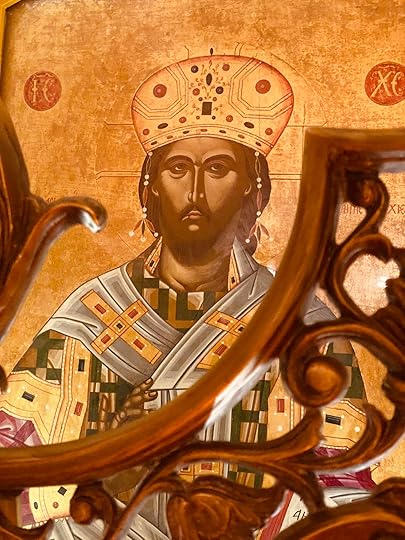Every Easter is an Advent

Thanks for reading Tamed Cynic by Jason Micheli ! Subscribe for free to receive new posts and support my work.
In Cormac McCarthy’s novel, No Country for Old Men, the protagonist, Sheriff Bell, struggles to make sense of believing in a Living God in a world that seems overrun with darkness and demons. Fighting a losing war with drug dealers along the border, all Sheriff Bell can do is clean up the carnage, nurse its innocent victims, and wonder if there’s a God at all in this suffering world. In one scene towards the end, Sheriff Bell stops in a diner for lunch and spreads out the newspaper on the table in front of him.
A waitress brings him coffee and says to him, “I quit readin it.”
“I don’t blame you. I would if I could...”
“I don’t know why they call it a newspaper. I don’t call that stuff news.”
“No.”
“When was the last time you read somethin about Jesus Christ in the newspaper?”
And Sheriff Bell shakes his head, “I don’t know. I guess I’d have to say it would be a while.”
“I guess it would too,” the waitress says, “A long while.”
Jesus Christ— that’s the only new thing in this world.
And then the sheriff thinks of an old man he knows, a man who desperately wants the Living God to speak to him, to move in his life, to do something discernible in the world. “You’d think a man that had waited eighty some odd years on God to come into his life, well, you’d think God would come, say or do something. If he didn’t, you’d still have to figure that God knew what he was doin.”
Even when all the available evidence in the newspaper would suggest otherwise, God, being God, knows what he’s doing. “I don’t know what other description of God you could have,” Sheriff Bell concludes to himself.
“Woman, behold thy son.”
“Forgive them, Father, for they know not what they do.”
“My God, my God...”
We’re all familiar with the Son’s seven last words from the cross— a tree which John in his Gospel tells us is, actually, His throne. Less familiar to us is how the evangelists also show us the Father, the Living and Loquacious God, speaking on Calvary. The noonday sky puts on mourning clothes as Jesus breathes his last breath. The velvet rope in the Temple is torn in two. The earth quakes. Like Lazarus, the dead are called out of their tombs. Even the stones cry out. And for the first of these seven signs on Calvary, Christ’s Heavenly Father speaks to the wife of Pontius Pilate in a dream.
She’s the reason Pilate washes his hands and declares to us, “I am innocent of this man’s blood; see to it yourselves.” A few verses before Pilate absolves himself, his wife comes to him while he’s seated where Christ alone belongs, in the judgment seat, and she warns him, “Have nothing to do with that righteous one, for today I suffered a great deal because of a dream about him.” Perhaps the Lord said to her something similar to what he uttered in a dream to King Abimelek when the King of Gerar tried to take Sarah, Abraham’s wife, as his own. In that dream, the Lord said, “You are as good as dead, Abimelek, because of the woman you have taken. If you do not return her, you may be certain that you and all who belong to you will die.”
The Gospel according to Matthew begins with the God of Israel speaking to non-Israelites, that is, to Gentiles, in a dream. God speaks to the magi, telling them of King Herod’s murderous plot and summoning them home by another route. And the Gospel ends with God speaking to another Gentile and afflicting her with the Gospel truth that none are righteous save this righteous one, Jesus Christ. What Matthew would have us see in these dreams is that Almighty God is at work in the world even when and even where God’s faithful people cannot discern it. We’re meant to see in this sign, this dream, that the Living God has a purpose in the world, across all peoples— a purpose that is mysteriously and providentially taking shape in people’s lives despite all appearances to the contrary.
I don’t know about you, but Sheriff Bell isn’t alone. Whether we call it “crucifixion” or COVID-19, it can be hard to believe that God is at work in the Golgothas of our world. “Oh, that you would tear open the heavens and come down right now,” the prophet Isaiah pleads with the God who commandeered him. All too often, Isaiah goes on to say, God is a God who hides his face from us.
Sometimes it feels like God is the floor boss of a cruel casino, watching idly from a distance as we lose hand after hand after hand to the house. Sometimes it seems grace comes by faith not because grace is a gift that cannot be earned, but because the gracious work of God in our world is so imperceptible it can only be taken on trust. Often times, faith feels no more concrete or certain than, well, a dream. And we all know how difficult it can be to hold onto a dream once you’ve woken up to the real world.
Sigmund Freud famously attributed dreams to sexual impulses not to God. Of course, Freud also believed that God is an illusion and that faith is a form of wish fulfillment, a dream we wish were true. It’s a serious critique. After all, the conviction that God is up to something in the world, the belief that God, being God, knows what he’s doing, such faith is surely more attractive to us than the nightmares to which we’re accustomed to lately. In a world seemingly overrun with darkness and devils, our faith can seem an unlikely dream, yet it’s just as surely true that in just such a world, as W.H. Auden wrote, “Nothing that is possible can save us.”

Here it is, Good Friday, almost Easter, the hinge between the Old Age and the New, and it feels for all of us shut-ins like it’s the season of Advent. Contrary to popular misperception, Advent does not look back to Christ’s first coming. Advent looks ahead to— Advent longs for— His coming again. Advent is the season when Christians celebrate that the specter of the End is good news not bad news. Advent, says Fleming Rutledge, is a season that forbids denial; that is, Advent is when we hunker down and take stock of the world as it really is, in all its brokenness and brutality, and, in doing so, we long for the return of our King to complete His promised work of redemption.
Good Friday, says the Apostle Paul, closes the Old Age of Sin and Death and, with it, all the weapons with which the Power of Death afflicts us. But Easter, Paul says, God raising Jesus from the dead, it’s only the first fruit of what God is determined to do for all of Creation, which makes this time between the first fruit of Christ’s resurrection and the full bloom of God’s final redemption— this in between time is a single, long season of Advent. This is what Karl Barth means when he writes, “What other time or season can or will the Church ever have but that of Advent.”
Whether the calendar says it’s Good Friday or Easter, every day is Advent.
Every day of the Christian life is a life of waiting, calling due the IOU sworn by the One who promises, “Behold, I am the Alpha and the Omega, the Beginning and the End, the First and the Last, I am coming to you very soon.”
Coming finally to free his Good Creation from the Power of Death that afflicts it.
Thank you for reading Tamed Cynic by Jason Micheli . This post is public so feel free to share it.
I do not know why the Lord seems to tarry.
Nor do I know why, in the meantime, the Lord chooses to go about his work in unseen ways that can only be perceived by faith and can always be dismissed as dreams and illusions.
I can only offer you the promise spoken to the prophet Isaiah and shown to us on Golgotha that the Lord who sometimes hides himself from us does not do so to no purpose. We can only trust, with Sheriff Bell that God, being God, knows what he’s doing.
We can only trust.
And wait.
Wait for the crucified one to return.
Return not from the grave but return to us.
There’s more God’s going to do.
Which is to say, there’s a better world on the way.
It is NOT finished.
— If you liked this, check out the Good Friday collection whence it comes.
Share Tamed Cynic by Jason Micheli
 Read Tamed Cynic by Jason Micheli in the new Substack appNow available for iOSGet the app
Read Tamed Cynic by Jason Micheli in the new Substack appNow available for iOSGet the app
Jason Micheli's Blog
- Jason Micheli's profile
- 13 followers



